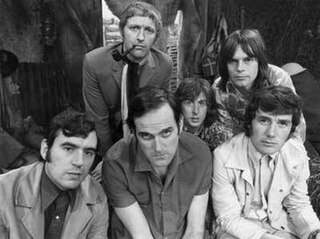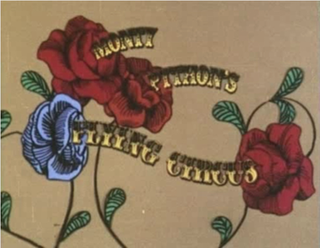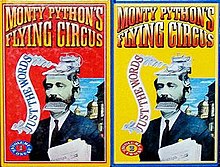
Do Not Adjust Your Set (DNAYS) is a British television series produced originally by Rediffusion, London, then, by the fledgling Thames Television for British commercial television channel ITV from 26 December 1967 to 14 May 1969. The show took its name from the message which was displayed when there was a problem with transmission.

Monty Python were a British surreal comedy troupe who created the sketch comedy television show Monty Python's Flying Circus, which first aired on the BBC in 1969. Forty-five episodes were made over four series. The Python phenomenon developed from the television series into something larger in scope and influence, including touring stage shows, films, albums, books and musicals. The Pythons' influence on comedy has been compared to the Beatles' influence on music. Regarded as an enduring icon of 1970s pop culture, their sketch show has been referred to as being "an important moment in the evolution of television comedy".
"The Funniest Joke in the World" is a Monty Python comedy sketch revolving around a joke that is so funny that anyone who reads or hears it promptly dies from laughter. Ernest Scribbler, a British "manufacturer of jokes", writes the joke on a piece of paper only to die laughing. His mother also immediately dies laughing after reading it, as do the first constables on the scene. Eventually the joke is contained, weaponized, and deployed against Germany during World War II.
"Crunchy Frog" is the common name for a Monty Python sketch officially titled "Trade Description Act", inspired by the Trade Descriptions Act 1968 in British law. It features two health inspectors interrogating the owner of a sweet shop about the increasingly bizarre ingredients in his confections, including the titular crunchy frog. Written by John Cleese and Graham Chapman, it originally appeared in episode 6 of the first series of Monty Python's Flying Circus, and later appeared in several Monty Python stage shows. In the original sketch, Cleese and Chapman play the inspectors, while the sweet shop owner is played by Terry Jones. In later versions, the second inspector is played by Terry Gilliam or left out of the sketch entirely.

At Last the 1948 Show is a satirical television show made by David Frost's company, Paradine Productions, in association with Rediffusion London. Transmitted on Britain's ITV network in 1967, it brought Cambridge Footlights humour to a broader audience.

Monty Python Live at the Hollywood Bowl is a 1982 British concert comedy film directed by Terry Hughes and starring the Monty Python comedy troupe as they perform many of their sketches at the Hollywood Bowl. The film also features Carol Cleveland in numerous supporting roles and Neil Innes performing songs. Also present for the shows and participating as an 'extra' was Python superfan Kim "Howard" Johnson.

"Argument Clinic" is a sketch from Monty Python's Flying Circus, written by John Cleese and Graham Chapman. The sketch was originally broadcast as part of the television series and has subsequently been performed live by the group. It relies heavily on wordplay and dialogue, and has been used as an example of how language works.
The Undertakers sketch is a comedy sketch from the 26th episode of Monty Python's Flying Circus, entitled "Royal Episode 13". It was the final sketch of the thirteenth and final episode of the second season, and was perhaps the most notorious of the Python team's television sketches.

Monty Python's Personal Best is a miniseries of six one-hour specials, each showcasing the contributions of a particular Monty Python member. Produced by Python (Monty) Pictures Ltd., the series first aired on PBS stations between 22 February and 8 March 2006, although the Eric Idle and Michael Palin episodes were initially released by A&E on two Region 1 DVDs in 2005; the remaining episodes were released in late February 2006.
The Fish Licence is a sketch from Series 2 Episode 10 of the popular British television series, Monty Python's Flying Circus. It first aired on 1 December 1970.
"Dirty Hungarian Phrasebook" is a Monty Python sketch. It first aired in 1970 on Monty Python's Flying Circus as part of Episode 25. Atlas Obscura has noted that it may have been inspired by English as She Is Spoke, a 19th-century Portuguese–English phrase book regarded as a classic source of unintentional humour, as the given English translations are generally completely incoherent.

Python Night was an evening of Monty Python-related programmes broadcast on BBC2 on 9 October 1999, to celebrate the 30th anniversary of the first broadcast of Monty Python's Flying Circus. It featured newly written sketches, three documentaries and a screening of Monty Python's Life of Brian.
"Anne Elk's Theory on Brontosauruses" is a sketch from Episode 31 of Monty Python's Flying Circus, "The All-England Summarize Proust Competition" (1972).
The "Architects Sketch" is a Monty Python sketch, first seen in episode 17 of Monty Python's Flying Circus, "The Buzz Aldrin Show". The episode was recorded on 18 September 1970 and originally broadcast on 20 October 1970. The following year, an audio version was recorded for Another Monty Python Record.

Monty Python's Flying Circus is a British surreal sketch comedy series created by and starring Graham Chapman, John Cleese, Eric Idle, Terry Jones, Michael Palin and Terry Gilliam, who became known as "Monty Python", or the "Pythons". The first episode was recorded at the BBC on 7 September 1969 and premiered on 5 October on BBC1, with 45 episodes airing over four series from 1969 to 1974, plus two episodes for German TV.
"The Mouse Problem" is a Monty Python sketch, first aired on 12 October 1969 as part of Sex and Violence, the second episode of the first series of Monty Python's Flying Circus.
"Albatross" is a sketch from Monty Python's Flying Circus. It is particularly known for its opening lines: "Albatross! Albatross! Albatross!"








